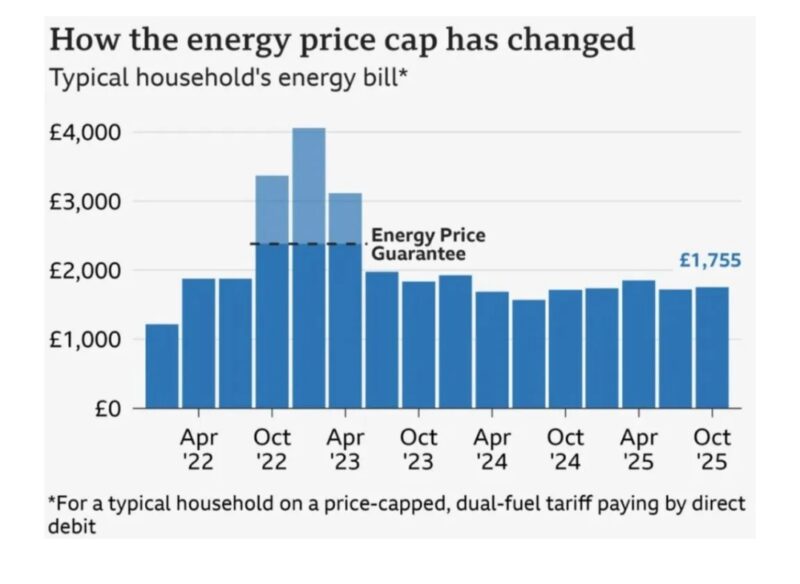Millions of households across the United Kingdom will see a 2% increase in gas and electricity prices this autumn under the latest energy price cap announced by regulator Ofgem.
According to BBC News, the change means the average household will pay around £1,755 per year, which is £35 more than the current cap. The revised cap takes effect in October and will remain in place for three months. Campaign groups have warned the rise could mean another challenging winter of high energy bills for families.
On average, bills will go up by approximately £2.93 per month per household. Of this amount, £1.42 will fund the government’s expanded Warm Home Discount scheme, which offers financial relief on winter energy costs for those receiving certain benefits. A further £1.23 will cover electricity balancing costs, such as switching off wind farms when demand is low or running gas plants when supply is short. Rising fixed charges to maintain the gas network will add about 72p per month, though some other costs have slightly declined.
Advertisement
READ MORE : “Tinubu Administration Will Hunt Terrorists Nationwide” – NSA Ribadu Assures
It is important to note that the cap limits the price per unit of energy, not the total bill. Household bills will still vary depending on usage. As a guideline, families can expect to add about £2 for every £100 they currently spend on energy each year.
Ofgem explained that the latest rise is partly driven by the costs of transmitting electricity nationwide to meet demand. Higher standing charges are also helping fund support measures, including the expanded Warm Home Discount. Standing charges will increase by 4% for electricity and 14% for gas, with the daily gas charge rising from 29p to 34p.
Anyone on means-tested benefits will automatically receive the £150 Warm Home Discount, and a previously controversial property-size condition that excluded some households has now been removed.
Currently, more than a third of UK households are on fixed-price energy deals, which are not affected by the cap. Ofgem’s Director General of Markets, Tim Jarvis, said this indicated signs of a “healthier market.” He acknowledged the financial impact on households but advised that customers could save money by paying via direct debit instead of standard credit.
Despite these measures, campaigners remain worried about affordability. UK families are still repaying a staggering £4 billion in energy debt built up over recent years of high prices. Simon Francis, coordinator of the End Fuel Poverty Coalition, warned this could mean “another winter of high prices,” adding that the average family “is still paying hundreds of pounds more than they did just a few years ago.”
Local community groups are also stepping in to help struggling households. At Parc Primary School in the Rhondda Valley, staff work with the Fuel Bank Foundation to distribute energy vouchers. Family engagement officer Leanne Gough said: “Sometimes you issue a fuel bank voucher and you can see the relief on their face, but it is a short-term solution. People are proud, so it takes a lot for them to come to ask. They will do everything they can beforehand.”
The government has defended the expansion of the Warm Home Discount, stating it will provide vital support to vulnerable families. Energy Minister Michael Shanks also stressed that boosting domestic clean energy production is key to reducing costs in the long run.
Industry body Energy UK, representing suppliers, said the expansion should be viewed as a temporary measure, with longer-term help better targeted at those most in need.
The political debate continues, with the Conservative Party blaming government policy choices rather than wholesale costs for rising bills. Meanwhile, Liberal Democrat leader Ed Davey argued that “the last thing” families and pensioners need this winter is higher energy prices.









